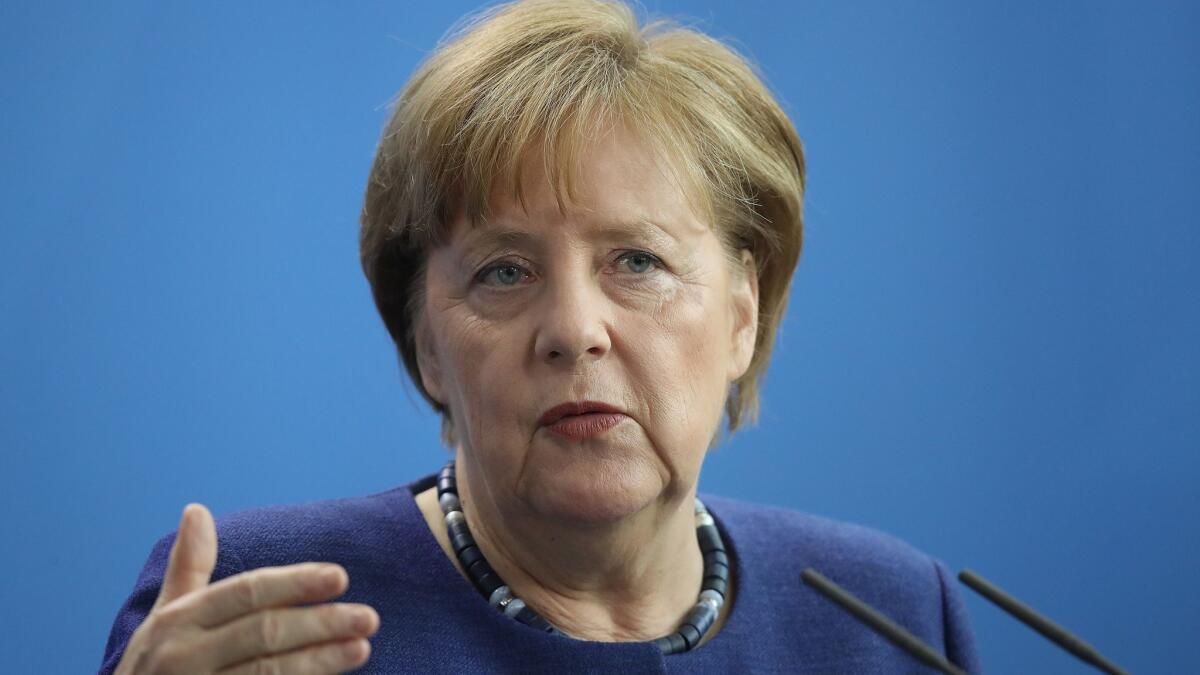Merkel condemns attack on two men wearing Jewish skullcaps in Germany

- Share via
Reporting from Berlin — German Chancellor Angela Merkel on Wednesday sharply condemned a street assault in Berlin on two young men wearing Jewish skullcaps that has stoked the debate about anti-Semitism in the country.
In a surprising twist, however, the victim of the attack, who identified himself on Israeli television as Adam Armoush, later told German TV that he wasn’t Jewish, but an Israeli from an Arab family.
Armoush told Deutsche Welle Television that he wore the skullcap to make a point to a friend who said it was risky to do so in Germany.
“I was saying it’s really safe and I wanted to prove it, but it ended like that,” he said.
Regardless of Armoush’s intention, it comes at a time of increased fears of anti-Semitism and indications that attacks against Jews are on the rise.
A video of the attack Tuesday showing Armoush being whipped with a belt quickly went viral with people assuming that Armoush was Jewish.
Merkel called the attack in the city’s trendy Prenzlauer Berg neighborhood “a very horrible incident” and vowed the government would respond “with full force and resolve” against growing anti-Semitism in Germany.
Foreign Minister Heiko Maas tweeted that “Jews shall never again feel threatened here.”
“It’s our responsibility to protect Jewish life here,” he wrote in reference to the killing of 6 million European Jews by the Nazis in the Holocaust more than 70 years ago.
Berlin police said the two men with the skullcaps were 21 and 24 years old, but didn’t identify them.
The video doesn’t show the outbreak of the fight or how it started, but Armoush told Israeli Kan TV that he was leaving his Berlin home when the three people started cursing at them.
“They kept cursing us and my friend asked them to stop cursing,” Armoush told Israeli Kan TV in Hebrew. “They started to get angry and one of them ran to me and I knew it was important to film it because there would be no way to catch him by the time police arrived.”
Police said they are still looking for the attackers.
Two Jewish organizations posted the video, which showed a young man attacking Armoush while yelling “Yahudi!” or “Jew” in Arabic.
The head of the Central Council of Muslims in Germany, Aiman Mazyek, demanded punishment for the perpetrators, tweeting that “it makes me angry to see such violence full of hatred.”
“There’s anti-Semitism among German citizens, unfortunately, and also anti-Semitism from the Arabic-speaking region and the government will do everything [against it],” Merkel told reporters.
Armoush didn’t respond to a request for comment from the Associated Press.
The RIAS group said Berlin saw 947 anti-Semitic incidents, including 18 attacks and 23 threats, last year.
Anti-Semitic incidents have been on the rise across Germany. Several Jewish students have reported anti-Semitic bullying in schools in recent months and Israeli flags were burned during a recent protest in Berlin.
Last week, a rap band that included cynical references about the Nazis’ Auschwitz death camp in its lyrics won the country’s most important music prize — drawing strong criticism from other artists and government officials. Several past winners said they would return their awards.

German rappers Kollegah and Farid Bang won an Echo award for their new album, including a track that contains the line “my body more defined than Auschwitz inmates.”
Their record company, BMG, defended the rappers Wednesday, citing “artistic freedom.” The musicians themselves denied anti-Semitism, but apologized for any offense caused.
In a separate incident, German aid group GIZ said Wednesday that it has taken action against several employees accused of posting anti-Semitic material on social media. The group, whose biggest client is the German government, said it fired one employee, issued a written warning to another and reprimanded a third.
GIZ said last month it was alerted by reports in Israeli media to the posts by staff working in Jordan, Israel and the Palestinian territories. One featured Israel’s flag with a Nazi swastika beneath the words: “I hate Israel.”
Tanja Goenner, chair of GIZ’s management board, said the group had “no reason to assume that anti-Semitism is a general problem.”
Earlier this month, Germany appointed a diplomat to coordinate government activities against anti-Semitism.
More to Read
Sign up for Essential California
The most important California stories and recommendations in your inbox every morning.
You may occasionally receive promotional content from the Los Angeles Times.










